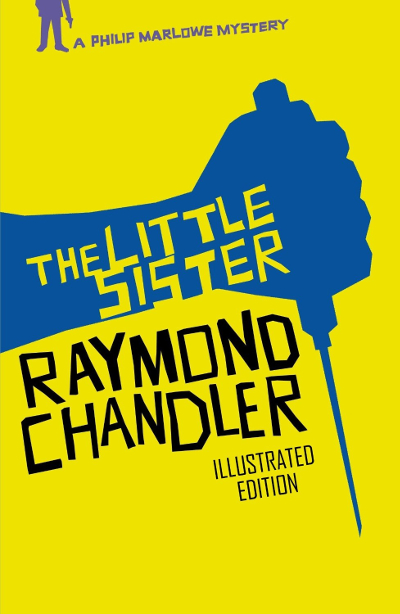|
Raymond Chandler's The Little Sister

The
Little Sister was published in 1949 and is the fifth book to revolve
around the sardonic and world weary hardboiled private detective hero
Philip Marlowe. Raymond Chandler was deeply depressed and distracted at
the time as his wife was ill and he had great difficulty finishing the
novel. It was written on and off during a period that overlapped with
him working for Paramount studios and he uses the story to throw some
barbs at Hollywood (a place that he never seemed to like an awful lot,
apparently find it shallow and tiresome) and also reflect on his
general weariness and unhappiness. Marlowe, like Chandler, is an
increasingly lost and disillusioned character in the book, almost
frozen in places, increasingly prone to introspection as he haunts his
familiar landscape of low rent post-war Los Angeles. There is always a
seedy underbelly lurking beneath the surface and this is where
Marlowe's cases inevitably lead him.The
story is set in 1947 and begins with Marlowe in his ramshackle office
one morning trying to swat a fly as he waits for a client to arrive. He
won't have to wait long. A woman named Orfamay Quest asks Marlowe to
find her missing brother Orrin. "She didn't have to open her mouth for
me to know who she was. And nobody ever looked less like Lady Macbeth.
She was a small, neat, rather prissy-looking girl with primly smooth
brown hair and rimless glasses." Orrin ran away to Los Angeles from the
Midwest and hasn't been heard from for a few months. His letters home
just stopped. Marlowe begins his search for Orrin, trawling through
cheap tatty boarding houses, and - as ever - what appeared to be a
fairly straightforward case at first glance soon becomes incredibly
knotty and complicated.It's
probably reasonable to say that The Little Sister feels less essential
than earlier Marlowe stories like Farewell, My Lovely and The Big Sleep
and doesn't have quite so many memorable supporting characters.
Chandler admitted that the book was written in a bad mood and he was
happy to be finished with it but the internal dialogue flourishes that
he gives Marlowe here are certainly interesting as an insight into how
Chandler was feeling at this stage of his life and career. "I was a
blank man. I had no face, no meaning, no personality, hardly a name. I
didn't want to eat. I didn't want to drink. I was a page from
yesterday's calendar crumpled at the bottom of the waste basket."Marlowe's
increasing sense of loneliness in the story echoes the way Chandler
felt with his wife often under the influence of sedatives and asleep
for days at a time. Chandler always felt her absence most in the
evenings because he no longer had anyone to talk to at night and there
is a memorable scene in the book where Marlowe is driving home in the
dark and all of a sudden can't face the thought of being alone and
turns his car around up to the hills of Los Angeles. "I ate dinner at a
place near Thousand Oaks. Bad but quick. Feed 'em and throw 'em out.
Lots of business. We can't bother with you sitting over your second cup
of coffee, mister. You're using money space. See those people over
there behind the rope? They want to eat. Anyway they think they have
to. God knows why they want to eat here. They could do better home out
of a can. They're just restless. Like you. They have to get the car out
and go somewhere. Sucker-bait for the racketeers that have taken over
the restaurants. Here we go again."Marlowe
is older now and more grizzled and cynical than ever but he's still on
the side of the angels despite the mean streets he has to navigate. He
might not be perfect but he'll never sell his soul to anyone. Marlowe's
sarcastic sense of humour is still very much intact though - as is his
Ian Fleming's literary James Bond capacity to take a beating and
stagger back to his office for strong coffee and eggs at some madly
unsocial hour. The wit of the character is more defensive than usual as
if it's now used to protect himself. The absurdity and harsh reality of
life is always far too apparent to our hard-drinking loner hero.The
story is twisty (probably too twisty in this case) in the usual
Chandler fashion and although not really his very best the sense of
time and place is still vivid and superbly captured. The actual reveal
is sort of explained to us at the end rather than presented as an
interlocking series of clues that the reader might be able to fathom
for themselves and although it seems to slightly contradict some of
Chandler's own thoughts on fiction of this type I don't think it's a
huge weakness in this context. Marlowe is not Sherlock Holmes and often
seems as if he's completely in over his head but it's his dogged
persistence rather than his detective skills than will inevitably win
through in the end however pyrrhic the victory might be. What Marlowe
has is a certain type of street savvy and the ability to size people up.The
key plot element is borrowed from an incident involving a real life
gangster (can't say who for fear of spoilers) and The Little Sister
notably brings Marlowe into the orbit of Hollywood. Chandler famously
worked as a writer on classic films like Strangers On A Train and
Double Indemnity but didn't have much affection for Hollywood. He was
removed from Strangers On A Train after loudly referring to Alfred
Hitchcock as a "fat b*******" and was highly irritated by Billy
Wilder's twirling cane (I'm not making this up) when he had to
collaborate with him. When Marlowe comes into contact with an actress
or observes the twinkling lights of Hollywood, Chandler lets us know
exactly how he (and his sardonic narrator of course) feels about
Tinseltown and the people who work there. "Behind Encino an occasional
light winked from the hills through thick trees. The homes of screen
stars. Screen stars, phooey. The veterans of a thousand beds."Marlowe's
relationship to the city ("The most of everything and the best of
nothing," says Marlowe) feels especially jaundiced in the novel and
inspires some very Chandleresque flourishes. Note how he contrasts the
natural beauty of the city with the man-made seediness it contains in
his introductory passage. A perfect example of the lyrical slightly
soppy and bitter cynical sides of Chandler all in one. "It was one of
those clear, bright summer mornings we get in the early spring in
California before the high fog sets in. The rains are over. The hills
are still green and in the valley across the Hollywood hills you can
see snow on the high mountains. The fur stores are advertising their
annual sales. The call houses that specialize in sixteen-year-old
virgins are doing a land-office business. And in Beverly Hills the
jacaranda trees are beginning to bloom."The
Little Sister is a very interesting read with some great moments but it
does unavoidably suffer a little when judged alongside the Marlowe
series as a whole and is a good book but one that feels like a slightly
strange later entry in a series that has already peaked. I love some
elements of the novel but it feels like Chandler never quite got a
handle on the plot in places - frazzled and distracted as he was at the
time and less willing to read the book over and rewrite as he might
usually have done. Still, it goes without saying, that even so-so
Chandler is still superior to most other works of detective fiction. - Jake
c 2018
Alternative 007
|

|


